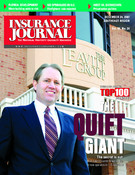Gov. Manchin at odds with lawmakers over system as it prepares for more private insurers
The latest power struggle between W.Va. Gov. Joe Manchin’s administration and lawmakers spilled out into the open recently.
Led by House Judiciary Chairwoman Carrie Webster, several legislative leaders quizzed Insurance Commissioner Jane Cline and her top lawyer about West Virginia’s ongoing process to privatize workers’ compensation.
Just hours earlier, the Joint Judiciary Committee had yanked a draft bill from its agenda that would create a new House-Senate oversight committee for this system that covers on-the-job accidents and diseases. Amid dissent, a subcommittee had endorsed the measure at October interims and asked Joint Judiciary to follow suit.
Webster, D-Kanawha, later said the committee held off so staff could address concerns raised in October — and because Manchin’s staff said he would veto any such measure.
Interim committees are preparing an array of bills for the 60-day regular session that begins Jan. 9. With the state’s workers’ comp market opening up to competition July 1, critics of the oversight proposal say they fear it will scare private insurers.
“Their response is they just don’t want this in writing,” Webster said. “Well, guess what: that’s our call.”
While not commenting on any veto threat, Manchin Legislative Director Jim Pitrolo said the administration deems such legislation unnecessary. “They have the authority to call Commissioner Cline before any committee they like,” he said. “The administration thinks that it’s not a good time to do legislation on the issue when you already have the power to do something internally.”
Series of Policy Changes
Webster grilled counsel Mary Jane Pickens over a series of policy changes that have emerged since the state-run program became BrickStreet Insurance Co. last year.
Webster cited BrickStreet’s aborted 2006 attempt to cut off death benefits to surviving spouses when the deceased worker would have reached retirement age. She then linked that oft-criticized move to two more recent proposals: One aimed at halting replacement wages once an employer appeals an award, as opposed to when the award is reversed as had been the practice. The other would have stopped reimbursing claimants for mileage from trips for medical treatment of vocational rehabilitation, unless they had been requested by the employer, Cline’s office or an insurance company.
With privatization, Cline’s office gets to write the necessary regulatory rules. But these rules are exempt from legislative review and approval.
Webster questioned whether the three episodes underscored the need for some oversight by lawmakers. Each departed from public policy or state law, she argued, and legislators did not find out until after the fact.
“Suddenly, the Legislature has found itself in a position where not only are we unable to say ‘We oppose this,’ but we find ourselves in the increasingly uncomfortable position of not knowing what’s been done,” Webster said.
Pickens and Cline both stressed that the death benefits and wage replacement changes have been rescinded, and predate their agency taking the regulatory reins. The change to mileage reimbursements has been dropped.
Webster counters that litigation, aided by a public outcry, turned back the first two changes. As for the mileage issue, she said she learned about that only because she’s a nonvoting member of the Industrial Council.
“I’m just concerned that it doesn’t happen again, and the track record I’m looking at isn’t giving me much confidence,” Webster said. “Why would the public not want us there for accountability, particularly after those three examples?”
Cline noted that the Legislature exempted comp from its rule-making authority back in the early 1990s. She said her office presents proposed rules to the Industrial Council at public meetings, followed by a public comment period and then a public hearing. “We are very open in the process,” Cline told The Associated Press. “We believe that there is already appropriate oversight. There always has been.”
The council includes three other nonvoting legislators besides Webster. Cline also said her office notifies more than 200 stakeholders of any proposed rule change by e-mail.
Cline said more than 40 insurers have expressed interest in competing with BrickStreet for workers’ compensation business come July 1. Thirteen of those companies are new to West Virginia. But some are also worried about the legislative moves, Cline said.
“They want to make sure they know who the regulator is,” Cline said. “We want to establish an environment where the insurers can understand the rules and can make a choice over whether to enter this market.”
Webster said she and other lawmakers consider that concern a red herring. She compared the oversight she’s seeking to what the Legislature already has with public education, which is also exempt from rule-making review. She further argues that workers’ compensation is different from home, auto or most other insurance because claimants are barred from suing for negligence.
“Every time I have raised my voice to express my concerns, I have been met almost uniformly with the line, ‘She’s trying to turn back workers’ comp,”‘ Webster said. “This is in no way, shape or form a front-door attempt to rescind what we’ve done. It’s about whether our legislative branch has delegated too much authority to our executive branch.”
Was this article valuable?
Here are more articles you may enjoy.


 The $3 Trillion AI Data Center Build-Out Becomes All-Consuming for Debt Markets
The $3 Trillion AI Data Center Build-Out Becomes All-Consuming for Debt Markets  Nine-Month 2025 Results Show P/C Underwriting Gain Skyrocketed
Nine-Month 2025 Results Show P/C Underwriting Gain Skyrocketed  Allstate Doubles Q4 Net Income While Auto Underwriting Income Triples
Allstate Doubles Q4 Net Income While Auto Underwriting Income Triples  Lawyer for Prominent Texas Law Firm Among Victims ID’d in Maine Plane Crash
Lawyer for Prominent Texas Law Firm Among Victims ID’d in Maine Plane Crash 


